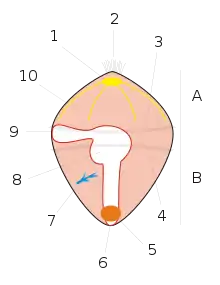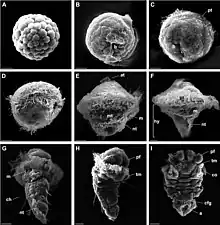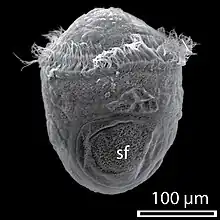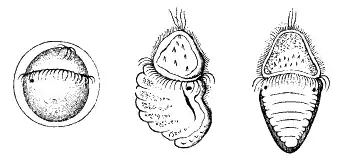
A - episphere
B - hyposphere
1 - ganglia
2 - apical tuft
3 - prototroch
4 - metatroch
5 - nephridium
6 - anus
7 - protonephridia
8 - gastrointestinal tract
9 - buccal opening
10 - blastocoele
A trochophore (/ˈtroʊkəˌfɔːr, ˈtrɒ-, -koʊ-/;[1][2]) is a type of free-swimming planktonic marine larva with several bands of cilia.
By moving their cilia rapidly, they make a water eddy to control their movement, and to bring their food closer in order to capture it more easily.
Occurrence
Trochophores exist as a larval form within the trochozoan clade, which include the entoprocts, molluscs, annelids (including echiurans and sipunculans) and nemerteans. Together, these phyla make up part of the Lophotrochozoa; it is possible that trochophore larvae were present in the life cycle of the group's common ancestor.
Etymology
The term trochophore derives from the ancient Greek τροχός (trókhos), meaning "wheel", and φέρω (phérō) — or φορέω (phoréō) —, meaning 'to bear, to carry',[3] because the larva is bearing a wheel-shaped band of cilia.
Feeding habits
Trochophore larvae are often planktotrophic; that is, they feed on other plankton species.
Life cycle

The example of the development of the annelid Pomatoceros lamarckii (family Serpulidae) shows various trochophore stages (image: D-F):
D - early trochophore ;
E - complete trochophore ;
F - late trochophore ;
G - metatrochophore.


References
- ↑ "Trochophore". Lexico UK English Dictionary. Oxford University Press. Archived from the original on 2020-03-22.
- ↑ "Trochophore". Dictionary.com Unabridged (Online). n.d. Retrieved 2016-01-21.
- ↑ Bailly, Anatole. "Greek-french dictionary online". www.tabularium.be. Retrieved 2017-01-24.
- ↑ McDougall, Carmel; Chen, Wei-Chung; Shimeld, Sebastian M.; Ferrier, David E. K. (2006). "The development of the larval nervous system, musculature and ciliary bands of Pomatoceros lamarckii (Annelida): heterochrony in polychaetes". Frontiers in Zoology. 3 (1): 16. doi:10.1186/1742-9994-3-16. PMC 1615870. PMID 17032451.
- ↑ Jackson, Daniel J.; Wörheide, Gert; Degnan, Bernard M. (2007). "Dynamic expression of ancient and novel molluscan shell genes during ecological transitions". BMC Evolutionary Biology. 7 (1): 160. Bibcode:2007BMCEE...7..160J. doi:10.1186/1471-2148-7-160. PMC 2034539. PMID 17845714.
External links
- Nielsen, Claus (2018-07-01). "Origin of the trochophora larva". Royal Society Open Science. 5 (7): 180042. Bibcode:2018RSOS....580042N. doi:10.1098/rsos.180042. ISSN 2054-5703. PMC 6083724. PMID 30109065.